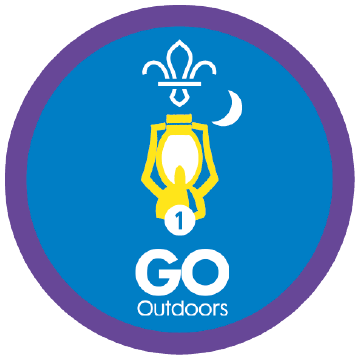Camping standards
You’ll need
- Pens or pencils
- A4 paper
- Folders
- Camping equipment
- Food
- This activity’s just an outline – we’ve left the details to you because you know your group best. Feel free to alter the score sheets, too.
- You could split into teams within your group, or different groups could come together to compete with others in the District.
- Camps need careful preparation; we’ve included an ‘Adult checklist’ for you to work through.
- You’ll need to ‘Build teams’ and ‘Prepare to camp’ before you set off on your adventure.
- During the event, adult volunteers will need to support, score, and mark each category of the competition, as well as supporting the football match. We recommend having two adults for every two teams – they need to be checked through the personal enquiry process and they need a valid disclosure too.
- Everyone will need to bring a packed lunch to camp. They’ll prepare and cook their evening meal and their breakfast.
- Confirm who’s attending. You need to know numbers of adults and young people to make sure you meet the ratios. You’ll also need to issue health forms to everyone.
- Book the campsite. For guidance on choosing a campsite, check out the Scouts website. You could also chat to your District or County.
- Discuss how you can take appropriate steps to reduce risk, and how you’ll divide the steps between everyone taking part.
- Make sure you’ve got the right permits and check the Nights Away responsibilities. Here’s some more information on the Nights Away Permit Scheme.
- Depending on how you’re planning to run the event, you may need to issue Nights Away Passports. Don’t forget that they need a supervision plan led by the appropriate Nights Away Permit holder.
- Fill in a Nights Away Notification Form.
- Follow the safety guidance on assessing risk, supervision, and the InTouch process.
- Everyone should get into teams of five or six. They should choose a team name. If you already have groups (such as Patrols), you could use these. You could also mix it up to make sure each team has a variety of experience and skills.
- The person leading the game should give each team a set of scoring sheets. They should explain that the competition will be judged on these five categories (site set up, gadgets, meal one, meal two, and packing away) as well as how well each team prepares.
- Each team should highlight the categories their whole team feels confident in. They should also highlight any categories where they’d like to brush up their knowledge.
- Everyone should get back together and chat about how confident they feel.
- The people leading the activity should make sure that everyone knows enough about each category before the competition begins. They may need to support people who may be feeling unsure. You might want to take some time to do activities that help everyone practise their skills, or you may want to let people share skills with other teams.
- Each team should choose someone to be their leader for each category of the competition. The leader should feel confident that they have the knowledge and skills they need to lead the category.
- Everyone should think about different styles of leadership.
-
- What style does everyone think they’ll use?
- Does it depend on the category they’re leading? The gadget tasks might need someone to lead by example, while the cooking might need a leader to delegate tasks.
- Each team should create a code of conduct to follow throughout the competition. They could include things like ‘always respect the leader’, ‘be honest with each other’, ‘ask for help when you need it’, or ‘be kind to each other’. Lots of sports teams have codes of conduct to make sure there’s structure. If people break the rules, the team manage it themselves.
- The person leading the activity should give each team a folder.
- The person leading the activity should tell everyone that their folder should include:
-
- health forms
- food menus
- shopping lists and receipts
- equipment lists
- people’s roles
- If people are using event passports, they should be in the folder too, and people may also want to include cooking recipes and a campsite layout.
- If the person leading the game hasn’t printed a list, people should jot down everything they need to include so they don’t forget anything. People can put their health form in an envelope if they don’t want anyone else in their team to see personal information.
- Each team should work through the list and work together to make their food menu, shopping list, and equipment list.
- An adult should support each team and help them with their final plan. The adult should make sure that the menu works, is balanced, and considers everyone’s dietary needs. They should also make sure that the shopping list and equipment list have everything the team will need (and that the shopping list’s likely to be in budget).
- Everyone should create a final copy of their plans. They should make sure they have the right forms to take home, and plan who’ll go shopping for food when.
- The person leading the activity should help everyone arrange when they’ll collect any camping equipment (such as tents and cooking equipment). They should also help everyone arrange how they’ll transport the equipment to the camping location.
- The person leading the activity should make sure everyone knows where they need to go, when they need to arrive, and what they need to bring with them.
This is just a suggestion of how your camp might run – feel free to adapt it to suit your group.
- Everyone should arrive at site at the time they agreed (in the morning’s best). They should have their camping equipment, personal kit, and a packed lunch with them.
- Each team should register with the judges and present their folders.
- The judges should check each team’s folder. They should collect all the health forms for safekeeping, check all the other information’s there (and correct), and confirm with each team when they’ll need to prepare their gadgets and meals.
- The teams should start setting up their sites. Meanwhile, the judges should wander around taking notes on the score sheet. Once the team’s site’s ready, they should let the judges know so they can mark the final scores on the sheet.
- At some point, the teams should stop for lunch and a break. Exactly when is up to them.
- The teams should start building their gadgets. They should build a boot scraper, gateway to their site, a washing line, a flagpole, and a washing up dresser. They should aim to use natural materials they can collect from the campsite, like fallen branches, as well as rope or string. Can teams figure it out with basic equipment and no instructions? If you want to prepare some resources to help, check out Scout Adventures.
- The teams should build a football gadget. They could choose a whistle, goal post, kit rack, score board, or subs bench. You may need to co-ordinate between the groups so you don’t end up with several score board and no goal posts!
- As the teams build their gadgets, the judges should wander around taking notes on each team’s leadership and teamwork. Once the gadgets are finished, the judges should test them and note down the final scores.
- Everyone should bring together their football gadgets.
- Everyone should take part in a game of football. It’s OK if not everyone wants to play: people could take the role of referee, team coach, photographer, or spectator. People can also take it in turns to play – unlimited substitutions are allowed!
- Once the game’s over, everyone should return to their sites and begin to prepare their evening meal. As usual, the judges should wander round taking notes on teamwork, leadership, cleanliness, and tidiness.
- Once the meals are ready, the judges should mark the final scores and everyone should tuck in.
- The adults should run some evening entertainment, for example, a campfire.
- Everyone should head to bed and enjoy some well-earned rest.
- In the morning, each team should prepare breakfast. Just like the evening meal, the judges should keep score.
- After they’ve enjoyed their breakfast, each team should begin to pack down their site as the judges keep score.
- Once each team’s finished packing down, they should let a judge know. The judges should inspect the site to make sure it’s clear of rubbish. Many sports teams are encouraged to keep their environment clean and tidy. The All Blacks rugby team tidy up their own dressing room at the end of each game.
- The people leading the camp should announce the results. They may want to acknowledge each team’s achievements and successes, as well as the final result. They should give each team their score sheet so they can read the comments and feedback.
This activity gives the people the chance to practise plenty of skills. You might want to get stuck in to some of these activities to make sure everyone’s ready for the challenge.
Pioneering
Camping
Reflection
It’s up to you whether you reflect at the camp or the next time you meet.
The camping standards competition needed everyone to work as a team to help people lead. Everyone had a chance to be the leader for a different task or category. Great leadership often relies on a great team. How did people support their leaders? Maybe they listened carefully to instructions or made helpful suggestions about how to build on ideas.
Did anyone see a great example of leadership from someone who wasn’t the chosen leader for that category? People don’t need to have the title ‘leader’ to help lead. For example, people may have explained the leader’s instructions to other people in the team, or helped the leader organise their thoughts and ideas to find the best way forwards. Leadership isn’t just something that goes downwards from the top. It can go sideways (among teammates), upwards (to those leading), or diagonally (to other teams).
Being a leader’s about doing your best, even before you see the results. Sir Alex Ferguson said ‘There’s a lot of satisfaction that comes from knowing you’re doing your best, and there’s even more that comes when it begins to pay off.’ What do people think this means? Can they think of an example from this camp? Perhaps writing a really detailed list paid off when it was time to cook a tasty meal and all the ingredients were there, or working hard to set up a well laid camp made camping even more enjoyable.
Safety
All activities must be safely managed. You must complete a thorough risk assessment and take appropriate steps to reduce risk. Use the safety checklist to help you plan and risk assess your activity. Always get approval for the activity, and have suitable supervision and an InTouch process.
- Fires and stoves
Make sure anyone using fires and stoves is doing so safely. Check that the equipment and area are suitable and have plenty of ventilation. Follow the gas safety guidance. Have a safe way to extinguish the fire in an emergency.
- Cooking
Teach young people how to use cooking equipment safely. Supervise them appropriately throughout. Make sure it’s safe to use and follow manufacturers’ guidelines for use.
- Heavy and awkward objects
Never lift or move heavy or awkward items alone. Ask for help or, if possible, break them down into smaller parts.
- Outdoor activities
You must have permission to use the location. Always check the weather forecast, and inform parents and carers of any change in venue.
- Poles and long objects
Be careful when moving poles or long items. Take care if the ends are sharp. Have appropriate supervision for this activity.
- Near water
Manage groups carefully when near water. The guidance on activities near water will help you to keep your group safe.
Feel free to alter the score sheets to suit your group – just make sure people know what they’re being judged on.
- Make sure your campsite is accessible for everyone. If people have additional needs or access requirements, work with the site in advance to make sure it’s suitable.
- Some people may need to know what to expect. You could run through the plan in ‘Camp’ with them or even use a social story.
- Make sure the meals are suitable for anyone with dietary requirements.
All Scout activities should be inclusive and accessible.
People’s experience in this activity (and the feedback on their score sheets) should help them identify areas that they’d like to build on, for example, pioneering, cooking, or pitching tents. Once people have identified which skills they’d like to work on, you could help them come up with a plan. Maybe people would like sessions on specific topics, or maybe another camp would help. Contact your District or County Scout Active Support Unit if you’d like their help, knowledge, and experience.
People can learn lots about leadership through experience – this includes practising leading others, as well as having the experience of being led. People could think about their own style of leadership (and ask friends for their thoughts) and who might have influenced their leadership style. Is their leadership style similar to any of the Manchester United leaders’ styles?



